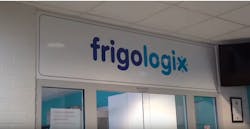Frigologix joins CryoHub project in Europe
Frigologix, one of the leading cold chain specialists in France and Belgium, recently joined the European Union’s CryoHub project as an industrial partner, agreeing to become the site for the CryoHub technology demonstrator installation.
“Frigologix is an ideal partner for this project due to their commitment to constantly investigating new ways to optimize energy use in the cold chain,” said project manager Judith Evans.
Frigologix started as a family business around 20 years ago and now provides logistic services for fresh and frozen food for multinational companies like McCain, Farm Frites and IGLO as well as local companies. Its site receives more than a hundred incoming and outgoing refrigerated vehicles per day. Committed to green energy, the firm has installed thousands of solar panels and is working on a project to establish a sustainability index for the logistics industry.
Begun in 2016, the CryoHub project will investigate and extend the potential for large-scale cryogenic energy storage. It is a 42-month, EU co-funded project under the Horizon 2020 program and includes a team of 14 partner organizations from 5 EU nations.
The CryoHub project explores the potential to maximize efficiencies by regenerating energy from refrigeration plants of food storage warehouses. Here’s how it works:
An important effect of generating power from liquid air is the ability to absorb heat at low temperatures. This is what cold storage does, so there is apparent synergy between cold storage warehouse facilities and cryogenic energy storage. Pure atmospheric air can be liquefied by employing renewable energy, which is then stored and used to generate electricity (via a turbine) at periods of peak grid demand. At the same time, refrigerated facilities can be cooled and waste heat can eventually be recovered to improve efficiency of cryogenic expansion.
Success of such technologies so far has been rather limited due to poor round trip efficiency (ratio of energy out to energy in) and unrecovered energy losses.
See www.cryohub.eu for more information.
